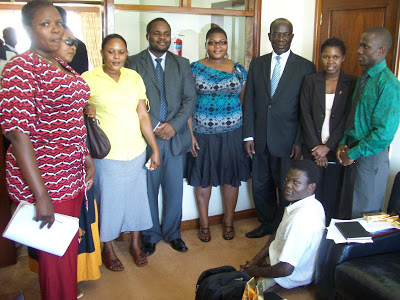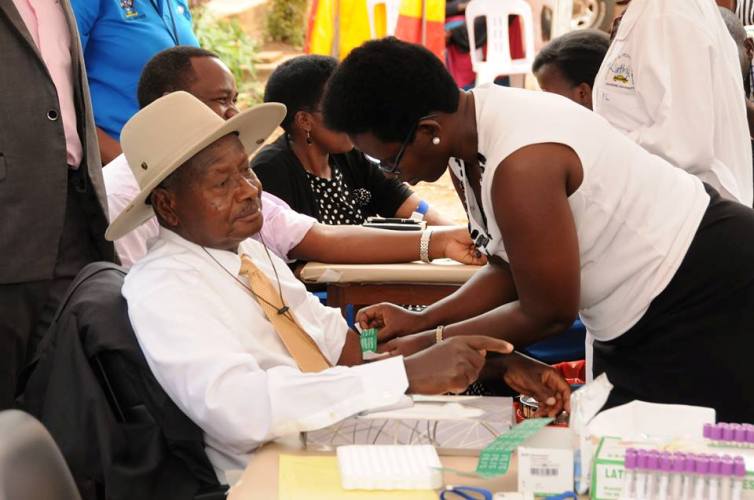In Uganda, lack of HIV data kills, but change is coming
Colin Stewart is a 45-year journalism veteran living in Southern…
UNAIDS in Uganda is in advanced stages of setting up a one-stop centre for all official data on the state of the HIV/AIDS pandemic in the country and Uganda’s response to it.

Amakobe Sande, the outgoing Uganda Country Director for UNAIDS (the Joint United Nations Programme on HIV/AIDS), told a meeting of activists in Kampala on June 7 that the data centre, called the Situation Room, will offer official, consolidated, up-to-date information on the epidemic. Among the activists at the meeting were those focused on HIV/AIDS, the right to health, human rights and the key populations that are most at risk in the epidemic.
The new concept, according to UNAIDS Uganda, is also being tried out in Kenya and Lesotho, among other countries.
Amakobe noted that the initiative will be launched in July of this year, bringing together “clean data” from Ministry of Health, the Uganda Aids Commission, and other key stakeholders in the national HIV/AIDS response. It will inform the President’s Office on what exactly must be done to scale down the rising prevalence and incidences of HIV in the country.

Currently, Uganda has disjointed sources of information on the national HIV/AIDS response. Much of the information is collected from epidemiology reports from health facilities, surveys and high-volume private health facilities.
Programmes of the Global Fund and Pepfar (the U.S. President’s Emergency Plan for Aids Relief) also generate some vital data. However, there has been no central point for sorting, disaggregating and analysing such data based on age, gender, economic situation (including displaced people and refugees), sexual orientation and/or gender identity — all of which is needed for effective planning.
As a result, only recently have officials realized that men are not being adequately addressed in national interventions against the deadly pandemic. In the 2017 Country Operation Plan for Pepfar in Uganda, men are a priority in programme activities, aiming to have men tested for HIV and, when appropriate, start them on antiretroviral therapy (ART).
Push for improved planning and accurate targeting

Health rights activists have long observed that lack of a proper Health Information Management system is hampering proper planning and precision in developing new interventions in the fight against the pandemic. Activists have openly criticized the government, saying that Uganda’s prevention funding is not accurately targeted what is driving the epidemic, as seen in Uganda’s 2011 National Prevention Strategy. Not enough money is invested in effective, evidence-based HIV prevention among vulnerable populations such a sex workers and men who have sex with men (MSM). (For example, see the August 2016 statement from 26 Ugandan civil society organisations calling for an end to “poor stewardship and lack of accountability in Uganda’s AIDS response.”)
In addition, Uganda’s political and legal environment has hampered efforts of positive health, dignity and prevention programs. A crucial factor was the now-annulled Anti-Homosexuality Act, which sought further exclusion of vulnerable populations and promoted intolerance and hatred.
The results can be seen in the data:
- Uganda is not reporting data on MSM and sex workers, because they are criminalized populations, although Uganda is obliged to do so in its role in the United Nations-led fight against the pandemic.
- Uganda also spends more on “Abstinence and Being faithful” (AB) programming than other countries in the region that have declining incidence. The data contain no evidence that these programs have had success in actually reducing the spread of HIV and increasing protection among communities at risk of infection.
Institutional mistrust has limited sharing of health data
Uneasiness between the Ministry of Health and the Uganda AIDS Commission has resulted in each institution withholding data, especially data related to men who have sex with men, for fear of being smeared in local media as gay sympathizers. Each agency distrusts the other and is wary of being accused of sympathy for homosexuals, even those merely seeking access to health care.
While Uganda AIDS Commission organizes the Joint Annual Review of the national HIV/AIDS response to inform stakeholders about what is going on, the Ministry of Health also organizes its own Annual Health Sector Reviews. The separate events are two weeks apart.
Consultants in Kampala who compile reports to be presented at both events told Erasing 76 Crimes — on condition of strict anonymity so they would not lose business — that they have difficulty accessing even the most basic data from either institution.

An example of homophobic accusations between government officials came in 2014, when the Ministry of Health issued a circular signed by the then health minister, Ruhakana Rugunda, currently Uganda’s prime minister, with responsibility for all health facilities in Uganda. It instructed health care professionals not to discriminate in allowing people access to health care, even though Parliament had just passed the controversial Anti-Homosexuality Act 2014 (which was later quashed by the Constitutional Court).
In response, officials in the Uganda AIDS Commission — which is directly under President’s Office and is influenced by Pastor Scott Lively’s anti-homosexuality campaign, as previously discussed on this blog — began criticizing colleagues in the Ministry of Health for promoting homosexuality. The fallout has significantly affected the national response to the HIV/AIDS pandemic.
A result of such disputes and accusations is that HIV prevalence in Uganda has increased to 7.3% of the population from 6.4% in 2004, with the latest reports also indicating a rise in new infections. A new Ugandan government study (obtained by the Erasing 76 Crimes blog and discussed in a Feb. 7 article) indicates that Uganda’s HIV burden has risen from 1.4 million people infected in 2013 to 1.5 million in 2015.
That study, the Uganda HIV and AIDS Country Progress Report by the Uganda AIDS Commission, focused on the period from July 2015 to June 2016. It assessed the first year of implementation of Uganda’s National HIV/AIDS Strategic Plan (NSP).

New approach to addressing the pandemic
President Yoweri Museveni on June 6 launched an ambitious five-point plan to end HIV/AIDS in the country by 2030 with the main focus on voluntary testing for men. Code named the “Presidential Fast-Track Initiative on HIV and AIDS in Uganda,” the plan seeks to engage men in HIV prevention in order to close the gap on new infections, particularly among adolescent girls and young women.
The face of AIDS-related deaths in Uganda often is men who are not tested for HIV and do not receive prevention and treatment services. Under the new plan, Uganda intends to attain its 90-90-90 targets particularly among men and young people. The UNAIDS 90-90-90 target calls on countries to ensure that 90 per cent of people living with HIV are diagnosed by 2020, 90 per cent of diagnosed people are put on antiretroviral treatment by then, and 90 per cent of people on treatment have fully suppressed viral load by then.
The forthcoming launch of Uganda’s data-filled Situation Room, with help from many United Nations agencies, follows the recent visit by UNAIDS Global Executive Director Michel Sidibe.
It will be seen as a major breakthrough in confidence-building between Uganda and the Western powers that fund a big chunk of the national HIV/AIDS response.

Mistrust of foreigners
The Situation Room will also be seen as a confidence-building measure that can reduce recent unease and silent diplomatic friction between Uganda and her international partners over health data management, especially the ownership of biomedical and health information, which is being seen as a sensitive national-security matter for Uganda.
Some security officials in Uganda believe that Uganda must have sole ownership of biomedical and health data for national security interests. HIV/AIDS was rampant in the national army, which prompted President Museveni’s earlier calls for intervention. (See the 2006 study “The Politics of HIV/AIDS in Uganda.”) Uganda is not comfortable sharing the health status of its army with Western countries for political reasons.
Diplomatic maneuvering
Another silent contention is the possibility that biomedical and health data could be used to “ inconvenience Uganda State guests” under its care. Some security and senior civil servants in Kampala told Erasing 76 Crimes that Uganda has an obligation to help people being persecuted in their own countries, including refugees. Additional urgency comes from local media accounts of reports suggesting a U.S. Central Intelligence Agency revelation that North Korean current leader Kim Jong-Un studied as a schoolboy at Kitante Primary School, an average school in Kampala.
Ugandan officials fear that Western countries may harm Uganda’s State guests that they do not agree with politically. Western countries, including the United States, have openly warned Uganda against giving covert aid to North Korea and Iran, which are under embargoes. Uganda is still a member of the Organization of Islamic Cooperation, a bloc of mainly Muslim nations with a total population of 1.6 billion. Uganda became a member in 1974 under former Ugandan dictator Idi Amin, a Muslim.
Uganda is being seen broadly as sympathetic to Islamic freedom fighters including hosting deceased former Palestinian President Yasser Arafat and deceased former Libyan strongman Muammar Gaddafi, among others. Uganda’s police force has received support from Iran and North Korea. However, Uganda has cancelled support from North Korea, after a visit last year by now-jailed former South Korean President, Park Geun-hye.

Israeli Prime Minister Benjamin Netanyahu has often visited Uganda for what some observers see as attempts to assure Kampala’s support for Israel statehood. He also visited to mark the deadly Entebbe raid of 1976 in which his own brother, Yonatan Natanyahu, was killed during a daring Israel commando rescue mission to free hostages on Air France Flight 139 which carried many Israeli nationals. That flight was diverted to Entebbe 41 years ago, when Amin was in charge.
Uganda’s Western allies fear that their interests may be hurt in Uganda by people who politically oppose them. But Ugandan leaders frame the issue differently, saying that Western enemies are not necessarily Uganda’s enemies. None of the Western countries has openly indicated that it collect intelligence using health care data.
Uganda is torn between its Western allies and its friendship with powerful Middle East and Muslim countries. Those countries include nations who were branded by President George W. Bush as belonging to Axis of Evil. Those friendly countries assure Uganda of favorable loans from Arab lending institutions, rather than the West-leaning International Monetary Fund, which tends to attach strings to its loans, such as demands for improvement of human rights, including homosexual rights.
The visit of UNAIDS leader Sidibe, accompanied by President Museveni’s public acknowledgment of blame for the rising rate of HIV/AIDS infections, is seen as a trust-building measure. Most Ugandan officials trust Sidibe.
Related articles:
-
(June 2017, 76crimes.com)
-
Museveni admits some blame for Uganda’s failing AIDS fight (June 2017, 76crimes.com)
- LGBTI activists seek greater role in Uganda AIDS battle
(February 2017, 76crimes.com)
- Uganda: Anti-LGBT stigma restricts health care; HIV rate up (February 2017, 76crimes.com)
- Hurrah! Uganda prepares to rein in anti-gay anti-Aids agency (January 2016, 76crimes.com)
- Will anti-gay Ugandan derail Global Fund efforts? (December 2015, 76crimes.com)
- Fighting AIDS with rural LGBTI, sex workers in Uganda (August 2015, 76crimes.com)
- Uganda: U.S. picks AIDS contractor, ousts anti-gay group (July 2014, 76crimes.com)
- Anti-gay fervor in Uganda hurts region’s AIDS projects (May 2014, 76crimes.com)
- Uganda: Raided clinic reopens with scaled-back services (May 2014, 76crimes.com)
- Uganda police raid U.S. military AIDS clinic, order it shut (April 2014, 76crimes.com)
- U.S. blames Uganda for raid on gay-friendly AIDS clinic (April 2014, 76crimes.com)
- To learn how to prevent and treat HIV/AIDS, check these out (September 2016, 76crimes.com)




This is a very brave report to write, Kiko. Your nation will be very grateful to you for saving lives of people living with HIV and preventing many thousands from infection.